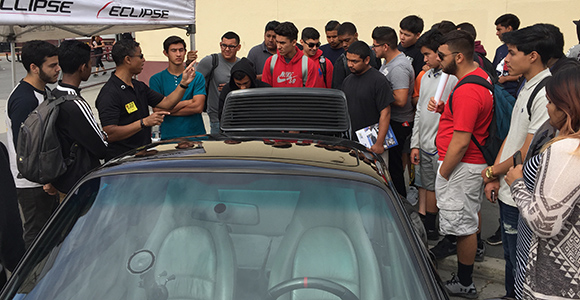
Colton High School students attend car show organized San Bernardino Valley College to promote automotive industry careers (Photo Credit: California Community Colleges)
“Automotive service technician is one of the hottest job sectors in the country that no one has heard of.”
That’s how Tony Sciarra, Tesla Motors’ program manager for vocational and trade schools describes the job market. And if you live in the Inland Empire and your son or daughter is into cars, know that jobs are available there now.
That’s why nine community colleges in the region will use nearly one million dollars in new career technical education funding to update automotive labs for electronic vehicles and hybrids that practically every major auto manufacturer is producing.
In the program's certified proposal, it is estimated that there is the need for 462 automotive service technicians and mechanics each year for the next five years. But the training system—as it exists now—is producing less than half of those skilled workers.
“Not only are we upgrading labs and programs and curriculum for training, we also want to upgrade the image of careers in the automotive industry,” said Larry McLaughlin, the California Community Colleges deputy sector navigator for advanced transportation and renewable energy in the Inland Empire.
The programs which will improve training especially on electronic and hybrid systems will be featured at nine community colleges: Barstow, Chaffey, College of the Desert, Copper Mountain, Mt. San Jacinto, Palo Verde, San Bernardino Valley. Victor Valley, and Riverside City.
Some of those schools are reaching out to local high schools to promote the opportunity—holding car shows that are drawing quite a bit of interest.
“I was in their shoes and didn’t know what I wanted to do,” said Edgar Ramirez, who returned to San Bernardino Valley College after 24 years working in the automotive service industry in order to gain certification. “Now I encourage them to do well in Math and English and come to community college.”
Ramirez is pursuing a double major in automotive collision and welding technology and may pursue a civil engineering degree at Cal Poly Pomona.
As he tells the students, “without technicians the world will stop.”
For Tesla’s Sciarra, the industry is ripe with potential, and the community colleges are filling a need.
“The skills gap is real. Technology advances and people retiring are opening up jobs that need skilled workers. You don’t necessarily need a college education to find a great job, but some post-secondary and certification is needed and the community colleges offer that avenue,” Sciarra said.
The program is one of 102 workforce-training programs that have been certified in the Inland Empire as part of the $200-million Strong Workforce Program being managed by the California Community Colleges. Nearly $22 million in career technical education funds will be spent in the region to prepare workers needed for a number of economic sectors.
“The Inland Empire Economic Partnership is a supporter and advocate for the Strong Workforce Program,” said Paul Granillo, president and CEO of IEEP. “Aligning the needs of the employer community with an effective and focused community college system will help change the economic circumstance of individuals and regions.”
The California Economic Summit — now in it's sixth year — identified workforce development as a top priority and created a workforce action plan in the 2017 Roadmap to Shared Prosperity that aims to produce one million more skilled workers over the next decade.
As McLaughlin points out, preparing automotive service technicians and mechanics is more than handing them tools.
“With today’s sophisticated technology our students spend more time with a laptop than under a hood.”
Oh, and one more thing: This industry is not just for men anymore.
One of Edgar Ramirez’ classmates recently won a regional welding gold medal. Her name is Dulce Benavides.

